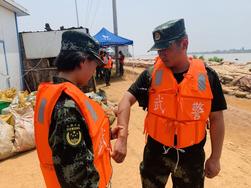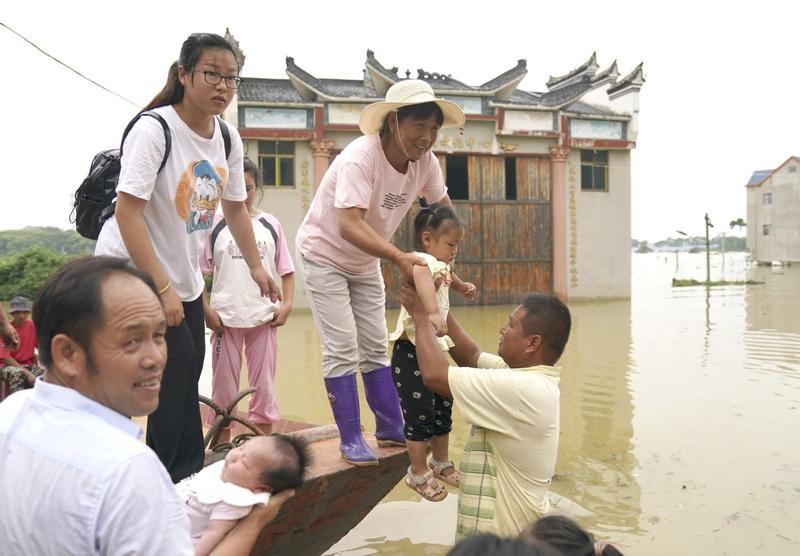 Liang Yaru checks scratches from sandbags on her husband Hua Lingyun's arm during a break in Poyang county, Jiangxi province, on Wednesday. (PHOTO PROVIDED TO CHINA DAILY)
Liang Yaru checks scratches from sandbags on her husband Hua Lingyun's arm during a break in Poyang county, Jiangxi province, on Wednesday. (PHOTO PROVIDED TO CHINA DAILY)
Since arriving in Poyang county, Jiangxi province, on July 10 to participate in flood control and disaster relief, 31-year-old Hua Lingyun has kept his phone on 24 hours a day.
Hua, head of the information and communication division of the mobile detachment of Jiangxi's Armed Police Force, mainly ensures lines of communication are kept open among different sections of the force.
Many towns in the county were flooded, and large areas of fields and houses were still underwater
Currently, he is working on the Jiangjialing to Zhujiaqiao section of the dike on the Changjiang River in Poyang. The river connects with Poyang Lake, China's largest freshwater lake, which is dealing with rising water levels due to heavy rainfall.
Many towns in the county were flooded, and large areas of fields and houses were still underwater. Downtown Poyang is about 3 kilometers from the dike where Hua is working. So far, the dike, newly reinforced with sandbags by the armed police, has successfully resisted the flood.
Hua's first flood-related memory is of his parents, who participated in fighting the deluge of 1998, one of the largest floods in the history of the People's Republic of China. Hua's parents are retired doctors from the Hospital of Jiangxi Provincial Armed Police Corps.
 Zhang Jiangyan (in glasses) prepares to take her two daughters to her family in a boat along with other villagers in Poyang county, Jiangxi province, on Thursday. Two-thirds of the village has been soaked in floodwaters, and villagers have to rely on boats to travel. (FENG YONGBIN/CHINA DAILY)
Zhang Jiangyan (in glasses) prepares to take her two daughters to her family in a boat along with other villagers in Poyang county, Jiangxi province, on Thursday. Two-thirds of the village has been soaked in floodwaters, and villagers have to rely on boats to travel. (FENG YONGBIN/CHINA DAILY)
He was only 10 at the time and remembered it rained almost every day. His father came home one day, packed a bag of clothes and left quickly for a business trip. Several days later, his mother sent Hua to his grandparents' home, where he lived for over one month until his parents came back.
ALSO READ: Exploring new ways to manage floods
Hua now has a young son who is being cared for by his parents in Nanchang, capital of Jiangxi. He has connected with the family almost every evening since he arrived in Poyang.
"Sometimes I cannot see my kid, because I need to deal with my work on the front line, and when I have finished the work, he has already fallen asleep," Hua said. "Of course, I miss him, and every time my parents post a video of him in the family's WeChat group, I miss him even more."
Hua participated in flood control in Jiujiang, Jiangxi, which lies north of Poyang Lake, in 2016 and 2017. But he said the flood this year is more severe.
"The highest water level was only 10 centimeters lower than the new dike built by armed police. But I was not nervous, because it didn't help to be nervous," he said. "I believe the new dike built by our comrades is very solid."
Hua needs to get up at 6 am every day and work until 1 am the next day. He said his work is much easier than those who built dikes or move sand and soil.
When armed police officers stand on the dike, they need to shoulder the responsibility of protecting the people behind it, he said.
"It is quite tiring, and many armed police officers here may fall asleep on the grassland in their wet and muddy clothes, but I think it is meaningful for us to attend to the task of fighting the flood, as every sandbag that we put on the dike can protect the people who trust us," Hua added.
Hua's wife, Liang Yaru, is also on the Jiangjialing to Zhujiaqiao section of the dike. She arrived in the county on the same day as Hua.
Liang, 30, is a nursing assistant at the Hospital of Jiangxi Provincial Armed Police Corps. She joined the armed police in 2008, and this is the first time she has participated in flood control efforts. She has to walk back and forth on the dike during the day to check if the soldiers have any medical needs, and at night she and her colleagues also need to check the soldiers and render aid if necessary.
Because of the high temperatures in the county, some soldiers have different degrees of sunburn and heat rash. Others have developed eczema after remaining on the front line for days.
Liang also chats with the soldiers, which gives them psychological comfort, letting them know that medical personnel is with them all the time.
"I know many of the soldiers here," she said. "I also feel distressed when I see their sunburns and heat rash. We know that if they can rest in a dry and cold environment they can recover quickly, but the flood is pushing everyone to stick to our position," she said.
Although she and her husband work in the same area, they barely have time to chat face-to-face. The couple mainly communicates over the phone, and they also send short messages to the family's WeChat group to tell their parents they are safe.
"My mother read an article online and saw the photo of my husband and me, then she said she felt moved when she saw other people's children on the front line fighting floods, but she was distressed when she saw her own children. I comforted her that day and asked her to trust that we will win," she said.
"Only by experiencing the flood in person can I understand the great responsibility of the armed police and soldiers and fully appreciate the hard-won achievements garnered from fighting floods," she added. "I am so glad to see that the water level is gradually decreasing, but the weather forecast said there may be rainfall in the days ahead, so we will keep a close eye on things."
Zhang Fuyin, who lives in Zhujiaqiao village about 100 meters from the dike where Liang works, said that the flood was terrible, but with the armed police and the soldiers, she won't be afraid any more.
The soldiers have also formed a wall of sandbags in case the flood comes toward the village.
"We can sleep well these days with their efforts," said Zhang, 77. "Although there is no running water, daily life hasn't been affected too much by the flood. There are also speakers to warn us if an emergency happens."
READ MORE: China can water down impact of floods
"I appreciate the soldiers who built the new dike in such a short time. Otherwise, my house would be surrounded by water, so we will also do what we can to support them. They have had a hard time in recent days," she added.


